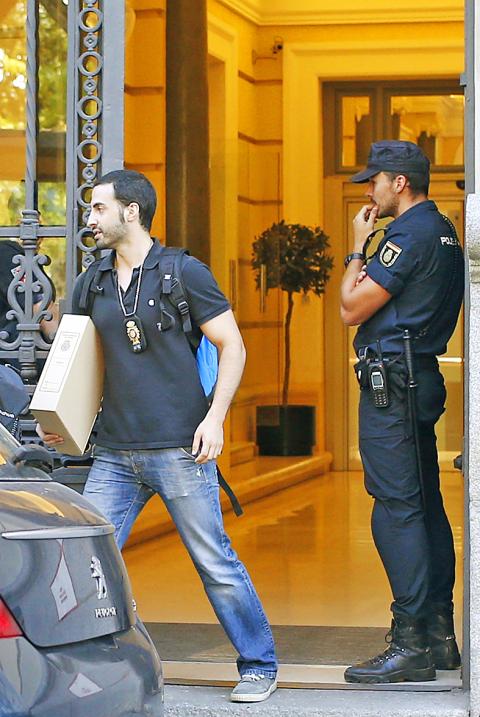Gotham City Research lists no physical address or telephone number, never signs its reports and does not identify any personnel.
Yet the shadowy research firm, practitioners of a controversial practice known as short selling that places downward bets on stocks, has claimed to be a kind of Batman of finance, fighting lies and fraud.
Its latest victory, which seems to buttress those claims? Successfully weeding out chicanery at former tech highflyer Let’s Gowex of Spain.

Photo: Reuters
Gotham’s 93-page report documenting fraud at Gowex, initially dismissed by the Spanish Wi-Fi company as “defamatory,” was vindicated on Sunday when Gowex unexpectedly declared bankruptcy after its CEO admitted faking results for at least four years.
“Question: Who is to expose the misdeeds of such fraudsters?” Gotham City asks on its Web site. “Answer: Short sellers, as the Gowex case clearly demonstrates.”
“Auditors, regulators, lawyers, investment bankers, and others rarely detect fraud. Insiders and short sellers do,” it said.
Yet an aura of impropriety also invariably surrounds short sellers — avowed mudslingers of the financial world who profit by driving stock prices lower. Critics say the practice can be manipulated.
“They often get a bad reputation as people who spread negative news,” Georgetown University finance professor James Angel said.
Angel and other market watchers regard Gotham City’s rhetoric on the heroism of short selling as fanciful. Yet they concede Gotham and its peers provide a counterpoint to the market’s many voices who tirelessly — and sometimes dishonestly — talk up stocks.
“The short sellers are really our first line of defense against companies that are overhyped, the so-called pump-and-dump artists,” Angel said.
Gotham’s brand of short selling rests on correctly calling instances where stocks have soared on a shaky financial foundation. The short seller borrows the stock, sells it, buys it back at a lower price and then returns the stock to the owner, booking a profit.
“People ask: Are short sellers really informed of what is happening in the future, or are they manipulating the price so they can profit for themselves?” Purdue University finance professor Zhang Xiaoyan (張曉燕) asked. “The truth is a mixture of both.”
A certain amount of suspicion is inevitable for short sellers, but particularly with firms like Gotham that are not transparent.
Gotham was founded by Daniel Yu, a Massachusetts Institute of Technology graduate and a former hedge fund analyst, according to the Wall Street Journal. Gotham’s crusade against Gowex follows campaigns against insurance software company Ebix, specialty stone tile retailer the Tile Shop and British software company Quindell. In each case, Gotham published a damning report that immediately sent shares lower.

WEAKER ACTIVITY: The sharpest deterioration was seen in the electronics and optical components sector, with the production index falling 13.2 points to 44.5 Taiwan’s manufacturing sector last month contracted for a second consecutive month, with the purchasing managers’ index (PMI) slipping to 48, reflecting ongoing caution over trade uncertainties, the Chung-Hua Institution for Economic Research (CIER, 中華經濟研究院) said yesterday. The decline reflects growing caution among companies amid uncertainty surrounding US tariffs, semiconductor duties and automotive import levies, and it is also likely linked to fading front-loading activity, CIER president Lien Hsien-ming (連賢明) said. “Some clients have started shifting orders to Southeast Asian countries where tariff regimes are already clear,” Lien told a news conference. Firms across the supply chain are also lowering stock levels to mitigate

NEW PRODUCTS: MediaTek plans to roll out new products this quarter, including a flagship mobile phone chip and a GB10 chip that it is codeveloping with Nvidia Corp MediaTek Inc (聯發科) yesterday projected that revenue this quarter would dip by 7 to 13 percent to between NT$130.1 billion and NT$140 billion (US$4.38 billion and US$4.71 billion), compared with NT$150.37 billion last quarter, which it attributed to subdued front-loading demand and unfavorable foreign exchange rates. The Hsinchu-based chip designer said that the forecast factored in the negative effects of an estimated 6 percent appreciation of the New Taiwan dollar against the greenback. “As some demand has been pulled into the first half of the year and resulted in a different quarterly pattern, we expect the third quarter revenue to decline sequentially,”

Six Taiwanese companies, including contract chipmaker Taiwan Semiconductor Manufacturing Co. (TSMC), made the 2025 Fortune Global 500 list of the world’s largest firms by revenue. In a report published by New York-based Fortune magazine on Tuesday, Hon Hai Precision Industry Co. (better known as Foxconn) ranked highest among Taiwanese firms, placing 28th with revenue of US$213.69 billion. Up 60 spots from last year, TSMC rose 60 places to reach No. 126 with US$90.16 billion in revenue, followed by Quanta Computer Inc. at 348th, Pegatron Corp. at 461st, CPC Corp., Taiwan at 494th and Wistron Corp. at 496th. According to Fortune, the world’s

DIVERSIFYING: Taiwanese investors are reassessing their preference for US dollar assets and moving toward Europe amid a global shift away from the greenback Taiwanese investors are reassessing their long-held preference for US-dollar assets, shifting their bets to Europe in the latest move by global investors away from the greenback. Taiwanese funds holding European assets have seen an influx of investments recently, pushing their combined value to NT$13.7 billion (US$461 million) as of the end of last month, the highest since 2019, according to data compiled by Bloomberg. Over the first half of this year, Taiwanese investors have also poured NT$14.1 billion into Europe-focused funds based overseas, bringing total assets up to NT$134.8 billion, according to data from the Securities Investment Trust and Consulting Association (SITCA),